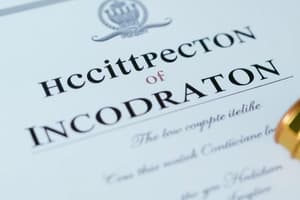Podcast
Questions and Answers
A corporation for a specific period ceases to exist and its dissolved ipso facto upon the expiration of the period fixed in the AOI, even if the legal requisites of extension of period are complied with.
A corporation for a specific period ceases to exist and its dissolved ipso facto upon the expiration of the period fixed in the AOI, even if the legal requisites of extension of period are complied with.
False (B)
Incorporators are those stockholders or members mentioned in the AOI, and they cease to be incorporators upon sale of their shares.
Incorporators are those stockholders or members mentioned in the AOI, and they cease to be incorporators upon sale of their shares.
False (B)
Corporation by estoppel applies when persons assume to form a corporation and exercise corporate functions and enter into business relations with third persons.
Corporation by estoppel applies when persons assume to form a corporation and exercise corporate functions and enter into business relations with third persons.
True (A)
There is a minimum authorized capital stock required for a corporation, except if provided by special law.
There is a minimum authorized capital stock required for a corporation, except if provided by special law.
The doctrine of estoppel is predicated on, and has its origin in, equity which is justice according to natural law and right, and it is a principle intended to avoid a clear case of injustice.
The doctrine of estoppel is predicated on, and has its origin in, equity which is justice according to natural law and right, and it is a principle intended to avoid a clear case of injustice.
The board of corporations vested with public interest shall have independent directors constituting at least 10% of such board.
The board of corporations vested with public interest shall have independent directors constituting at least 10% of such board.
Independent directors must be elected by the other directors present during the election of directors
Independent directors must be elected by the other directors present during the election of directors
The acts of corporate officers outside the scope of their authority are binding on the corporation
The acts of corporate officers outside the scope of their authority are binding on the corporation
The same person can simultaneously hold the positions of president and secretary in a corporation
The same person can simultaneously hold the positions of president and secretary in a corporation
The power to remove directors or trustees belongs exclusively to the officers of the corporation
The power to remove directors or trustees belongs exclusively to the officers of the corporation
In corporations vested with public interest, a compliance officer must be elected by the board
In corporations vested with public interest, a compliance officer must be elected by the board
The officers of a corporation are responsible for managing the corporation and performing duties as resolved by the board of directors
The officers of a corporation are responsible for managing the corporation and performing duties as resolved by the board of directors
A stockholder or member who participates through remote communication or in absentia shall not be deemed present for purposes of quorum.
A stockholder or member who participates through remote communication or in absentia shall not be deemed present for purposes of quorum.
Notice of meeting may be waived, expressly or impliedly, by any stockholder or member.
Notice of meeting may be waived, expressly or impliedly, by any stockholder or member.
Regular meetings of stockholders or members shall be held annually on a date fixed in the bylaws, or if not so fixed, on any date after April 15 of every year as determined by the BOD or trustees.
Regular meetings of stockholders or members shall be held annually on a date fixed in the bylaws, or if not so fixed, on any date after April 15 of every year as determined by the BOD or trustees.
In regular meetings of stockholders or members, a written notice of regular meetings shall be sent to all stockholders or members of record at least 21 days prior to the meeting.
In regular meetings of stockholders or members, a written notice of regular meetings shall be sent to all stockholders or members of record at least 21 days prior to the meeting.
A stockholder or member may not propose the holding of a special meeting and items to be included in the agenda.
A stockholder or member may not propose the holding of a special meeting and items to be included in the agenda.
The SEC can issue an order directing the petitioning stockholder or member to call a meeting of the corporation by giving proper notice, whenever for any cause, there is no person authorized or the person authorized unjustly refuses to call a meeting.
The SEC can issue an order directing the petitioning stockholder or member to call a meeting of the corporation by giving proper notice, whenever for any cause, there is no person authorized or the person authorized unjustly refuses to call a meeting.
In non-stock corporations, members are considered corporators who share in the income distribution.
In non-stock corporations, members are considered corporators who share in the income distribution.
Voting rights in non-stock corporations are unrelated to membership.
Voting rights in non-stock corporations are unrelated to membership.
Stockholders have the right to participate in the control and management of the corporation through their votes.
Stockholders have the right to participate in the control and management of the corporation through their votes.
The right to vote for corporate stock is considered a property right.
The right to vote for corporate stock is considered a property right.
The exclusive right to vote and be voted for directors in a corporation can extend beyond 5 years from incorporation without SEC approval.
The exclusive right to vote and be voted for directors in a corporation can extend beyond 5 years from incorporation without SEC approval.
Preferred stockholders have a lien on the corporation's property and are treated as creditors.
Preferred stockholders have a lien on the corporation's property and are treated as creditors.
The stock and transfer book must be closed for at least 20 days before a regular meeting and 7 days before a special meeting, unless the bylaws specify a longer period.
The stock and transfer book must be closed for at least 20 days before a regular meeting and 7 days before a special meeting, unless the bylaws specify a longer period.
Stockholders or members can exercise their right to vote only in person or through a proxy.
Stockholders or members can exercise their right to vote only in person or through a proxy.
The stock and transfer book records the names and addresses of all stockholders, the installments paid and unpaid on subscribed stock, and the payment dates.
The stock and transfer book records the names and addresses of all stockholders, the installments paid and unpaid on subscribed stock, and the payment dates.
The stock and transfer book is used to determine the persons entitled to the rights and liabilities of a stockholder.
The stock and transfer book is used to determine the persons entitled to the rights and liabilities of a stockholder.
Upon the death of a shareholder, the executor or administrator appointed by the court is not entitled to vote the deceased shareholder's stock.
Upon the death of a shareholder, the executor or administrator appointed by the court is not entitled to vote the deceased shareholder's stock.
The endorsement of a stock certificate by the owner or an authorized person, coupled with delivery, is sufficient to effect the transfer of shares.
The endorsement of a stock certificate by the owner or an authorized person, coupled with delivery, is sufficient to effect the transfer of shares.
Flashcards are hidden until you start studying




